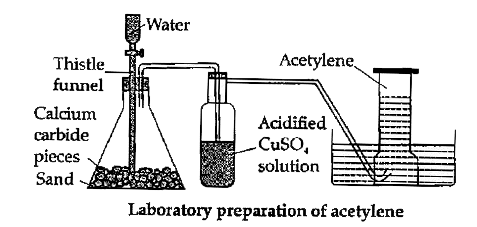When zinc granule is dipped into copper sulphate solution, copper is precipitated because :
Both, copper and zinc have a positive reduction potential.
Reduction potential of copper is higher than that of zinc.
Reduction potential of zinc is higher than that of copper.
Both, zinc and copper have a negative reduction potential.
The correct Answer is:B
To solve the question, "When zinc granule is dipped into copper sulfate solution, copper is precipitated because:", we need to analyze the electrochemical behavior of zinc and copper.
1. Identify the Reaction:
When zinc (Zn) is placed in a copper sulfate (CuSO₄) solution, a chemical reaction occurs. The zinc displaces copper from the copper sulfate solution.
Zn (s)+CuSO4(aq)→Cu (s)+ZnSO4(aq)
2. Determine Oxidation and Reduction:
In this reaction, zinc is oxidized (loses electrons) and copper is reduced (gains electrons).
- Zinc goes from Zn (0) to Zn²⁺ (+2), indicating oxidation.
- Copper goes from Cu²⁺ (+2) to Cu (0), indicating reduction.
3. Standard Reduction Potentials:
To understand why this reaction occurs, we need to look at the standard reduction potentials of both metals:
- The standard reduction potential for copper (Cu²⁺ + 2e⁻ → Cu) is +0.34 V.
- The standard reduction potential for zinc (Zn²⁺ + 2e⁻ → Zn) is -0.76 V.
4. Comparing Reduction Potentials:
Since the reduction potential of copper is higher than that of zinc, copper has a greater tendency to gain electrons (be reduced) compared to zinc. This means that in the presence of zinc, copper ions in the solution will be reduced to solid copper, while zinc will be oxidized to zinc ions.
5. Conclusion:
Therefore, the reason copper is precipitated when zinc is dipped into copper sulfate solution is that the reduction potential of copper is higher than that of zinc.
Final Answer:
Copper is precipitated because the reduction potential of copper is higher than that of zinc.
---
When zinc (Zn) is placed in a copper sulfate (CuSO₄) solution, a chemical reaction occurs. The zinc displaces copper from the copper sulfate solution.
Zn (s)+CuSO4(aq)→Cu (s)+ZnSO4(aq)
In this reaction, zinc is oxidized (loses electrons) and copper is reduced (gains electrons).
- Zinc goes from Zn (0) to Zn²⁺ (+2), indicating oxidation.
- Copper goes from Cu²⁺ (+2) to Cu (0), indicating reduction.
To understand why this reaction occurs, we need to look at the standard reduction potentials of both metals:
- The standard reduction potential for copper (Cu²⁺ + 2e⁻ → Cu) is +0.34 V.
- The standard reduction potential for zinc (Zn²⁺ + 2e⁻ → Zn) is -0.76 V.
Since the reduction potential of copper is higher than that of zinc, copper has a greater tendency to gain electrons (be reduced) compared to zinc. This means that in the presence of zinc, copper ions in the solution will be reduced to solid copper, while zinc will be oxidized to zinc ions.
Therefore, the reason copper is precipitated when zinc is dipped into copper sulfate solution is that the reduction potential of copper is higher than that of zinc.
Copper is precipitated because the reduction potential of copper is higher than that of zinc.
Topper's Solved these Questions
- BOOK - ICSECHAPTER - SAMPLE PAPER 2011EXERCISE - PART-II(SECTION-A)20videos
SAMPLE PAPER 2011
- BOOK - ICSECHAPTER - SAMPLE PAPER 2011EXERCISE - PART-II(SECTION-B)36videos
SAMPLE PAPER 2011
- BOOK - ICSECHAPTER - SAMPLE PAPER 2 (CHEMISTRY)EXERCISE - Questions70videos
SAMPLE PAPER 2 (CHEMISTRY)
- BOOK - ICSECHAPTER - SAMPLE PAPER 2012EXERCISE - PART-II (SECTION-C)21videos
SAMPLE PAPER 2012
Similar Questions
Knowledge Check
- Question 1 - Select One
When a copper wire is dipped into silver nitrate solution, silver is precipitated because
Aboth silver and copper have positive reduction potentialsBreduction potential of silver is higher than that of copperCreduction potential of copper is higher than that of silverDboth silver and copper have negative reduction potentials.
Which metal can deposit copper from copper sulphate solution ?
View SolutionState one observation: A zinc granule is added to copper sulphate solution.
View SolutionCopper sulphate is soluble in water.
View SolutionOn adding excess of NH4OH to copper sulphate solution
View SolutionExplain the following:
(i). Copper hydroxide is soluble in ammonium hydroxide but not in sodium hydroxide.
(ii). A dark blue precipitate is formed when sodium hydroxide solution is added to copper sulphate solution. The precipitate darkens on heating.View SolutionWhat happens when a zinc rod is dipped in copper sulfate solution ? Give the reason for this observation.
View Solution
Give the function of acidified copper sulphate solution.View Solution

